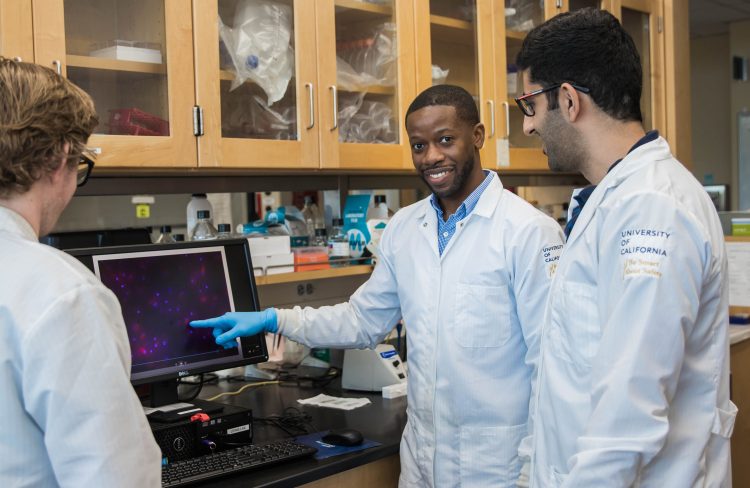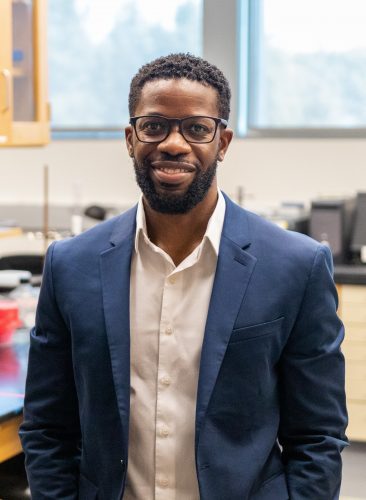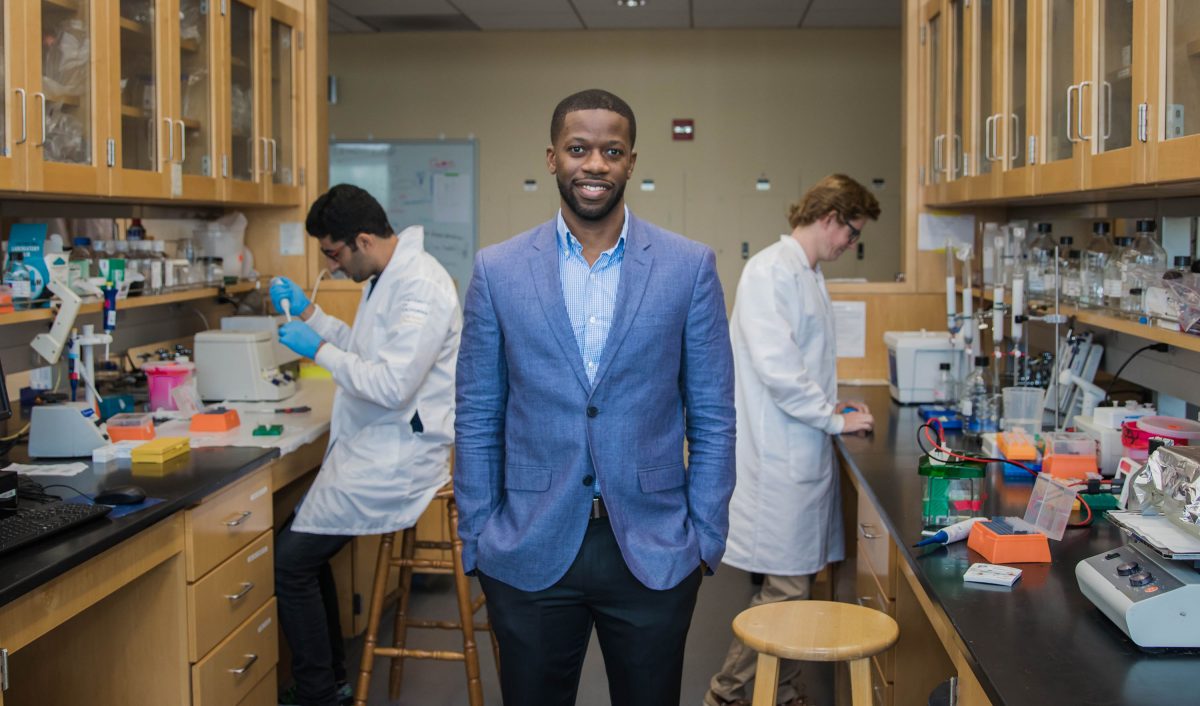As a child Jamal Lewis always knew that he was leaning towards a career in the science field as he performed excellently in Mathematics and Sciences, and while initially he concluded that he would become a medical doctor a light bulb moment came late in high school as he was watching a CBS 60 Minutes feature on tissue engineering.
In that programme, scientists had taken cells from a mouse and grown an ear on its back. Lewis said he found the entire thing fascinating. His fascination with biomedical engineering might have become clearer then, but he was always interested in how the immune system worked because of the initial impact of HIV/AIDS in Guyana and also the impact of diabetes in his own family.

“I just thought that was cool. I thought that was fascinating, I thought that was next generation. I thought that was the future of science. We could replace any organ just by growing it organically with the person’s own cells… in a way we could potentially be unravelling the holy grail of life, eternal life by just re-growing people’s organs…,” he said, laughing during a recent Zoom interview with this newspaper.
Lewis, now a doctor, is spearheading research on developing a vaccine that can reverse rheumatoid arthritis and autoimmune autism. Dr Lewis, who was born in Guyana and spent some of his formative years here before moving to Jamaica and then to the US, is currently an associate professor at the University of California, Davis, but later this year he is set to move to the University of Florida and join the J Crayton Pruitt Family Department of Biomedical Engineering, where his research will continue.
His pioneering work focuses on the development of biomaterial systems that can manipulate the immune system. The researchers hope to design the next generation of immunotherapeutics for applications in immune-related diseases and their work incorporates aspects of biomaterials engineering, drug delivery and immunology.
“Most of my life I have been pretty good at Maths and Science, from primary school right up to A-Levels… When it came to college, I started to think of what exactly I wanted to do and I think I got inspired by a couple of stories that I saw on 60 Minutes about what I should do next,” he said. He pointed out that typically in the Caribbean when persons excel in those two areas of study they move towards a career in medicine and that was his first thought right before he finished high school.

It was about that time, while his family lived in Jamaica, that he viewed the tissue engineering programme. His parents, both of whom worked in the science field, supported him, but they encouraged him to get a scholarship to pursue his dreams. His father, Leslie Lewis, was once Dean of the Department of Technology before moving to Jamaica, while his mother, Dawn Lewis, worked at the Institute of Applied Science and Technology (IAST). He said both of his parents were supportive of him and his sister, who is also into science, and pushed them to get into colleges in the United States and they were both successful.
He went off to university in Florida pursuing chemical engineering with a biomedical concentration as in 2001 most schools did not have a biomedical major, which is a newer field in engineering and in science.
‘So many people dying’
Chronicling his interest in the immune system, Lewis said it came before that programme as he recalled the impact of HIV/AIDS in Guyana had on him. Further, diabetes, which has an immune consideration — especially when it comes to type 1 diabetes, an autoimmune disease — is an issue in his family.
“As a kid growing up in Guyana you would have experienced so many people just dying from HIV; so many of my parents’ friends just disappeared. And so I think the conflation of those two things, thinking about how the immune system can control these diseases better, really motivated me to get involved in this field,” Lewis said.
This led him to biomedical engineering at the graduate level even though he could have branched off to other fields; that was where his heart was. He went off to North Carolina State University where he did a master’s degree. He later moved to the University of Florida, still with the intent of pursuing tissue engineering, but it was there he became intrigued with immune engineering.
“That has taken me on a whole other path to things that I am trying to do right now,” he shared.
Explaining the work he is now involved in, Lewis first spoke about how “complex and fascinating” the immune system is and how it is integral to human physiology.
“The immune system is involved in every single thing you can think about, every aspect of your body, of the proper function of your body, the immune system is involved and when things go out of whack with your immune system you end up with a disease,” he expounded.
Over the years he has done a “whole host of different things” in the realm of the immune system and currently his lab focuses on aspects of cancer and autoimmune diseases, such as rheumatoid arthritis, autism and allergies.
He said it is exciting for him to be involved in projects that are potentially revolutionary. He noted that about 1% of the world’s population is affected by rheumatoid arthritis, which sees the human immune system attacking joints and causing a lot of pain.
“We are trying to develop a sort of novel treatment for rheumatoid arthritis where we try to re-educate your immune system to not attack your joints and degrade and destroy your joints to the point where it is really painful for the person afflicted with it,” he explained. The lab is also looking at maternal antibody spectrum autism and is in the process of developing bio material to be injected into the mother to remove the antibodies before they get into the foetus’s brain, which causes autism.
“In a nutshell what we do, it is kind of similar to the COVID-19 vaccine that has been approved… in that, what we do is that we inject these agents that are loaded into particles or loaded on particles to sort of target certain cells in your immune system and re-educate those cells…,” he explained.
His work is in the developing stages but he said for rheumatoid arthritis there is a company that is looking to commercialise the technology.
Quite fond
Reflecting on his days in Guyana – before he left he was a first former at Queen’s College – Lewis said those days were quite fond. He was born in New Amsterdam but his family later moved to Georgetown, where he attended Stella Maris before secondary school.
“Most of my childhood in Guyana, I have really fond memories [of], whether it be fishing in the backdam, playing cricket on the streets, playing basketball on the streets. One of the things about me—although I am sort of a scientist, as a kid I played a lot and my mom would attest to this. You know, Stella Maris’s uniform was a white shirt and blue pants. If you had seen me back in the days you would have thought it was a brown shirt and brown pants,” he said laughing.
He applauded the teaching he received at Stella Maris as he said it gave him the grounding he needed to be at the level he is at now. And even though he had a short stint at Queen’s College he still gave kudos to the teachers.
His mother’s official title is medicinal chemist and pharmacist and for most of her time in Guyana she worked at IAST. In Jamaica, she taught at the University of Technology. His father is in academia and when he left Guyana he worked as an agriculture engineer at a few of the sugar estates in Jamaica.
In the future, Lewis hopes to make a contribution in the world of science in Guyana and the Caribbean, though he has not yet formulated how this will be done. In Jamaica, he has contacts at the University of the West Indies, Mona Campus, and a collaboration has started and they have applied for some international grants. He believes if he can replicate this in Guyana it would be “wonderful” even though he is not sure yet where to start. He noted that in the Caribbean region as a whole, research is viewed differently than in the developed world but he believes that with Guyana becoming an oil producing country more money would be plugged into science and technology.
Though he works in a competitive field that consumes most of his time, Lewis still enjoys sports and keeping to his Guyana roots and his dad’s profession he also does some gardening.
He is the second of three children. His older sister is also an associate professor in communication while his brother is a third-year student in medical school.
Lewis’s immediate goal is to become a full professor but in the big scheme of things at the end of his career he hopes that he would have produced some kind of medical technology or drug that improves people’s lives.
“That’s the ultimate for me. Once I have done that I can retire happy and content,” the young scientist said.






